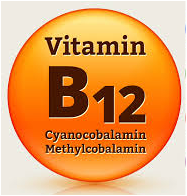
For those who may be new to the topic of B-12, a quick recap first. B-12 is a vitamin produced by bacteria. It is NOT made by animals or plants. In nature, animals obtain it by drinking microbial contaminated water, ingesting fecal contaminated matter, or eating plants with dirt and bacteria still attached. Many foods are fortified with B-12 too -- like almond milk, nutritional yeast, and some breakfast cereals. Once B-12 is in an animal's body, it can pass into their milk, or will be present in bodily tissues (this is how it ends up in meat). Some of our gut bacteria may make B-12 -- but this is believed to happen too far downstream from where we absorb it, to reliably benefit us. A B-12 deficiency is VERY BAD -- and can sometimes have no obvious symptoms until it damages the heart or brain (leading to heart attacks or dementia) it can also cause nerve damage, leading to numbness and tingling in parts of the body, blindness, or can even mimmic symptoms of MS. Some of these are not reversible -- so it's important to always get enough B-12. We only need a very tiny amount and some people can store it in their bodies for years, however stored B-12 may not be available to the babies of pregnant and nursing women-- so it is critical that they have a reliable and regular source! Also be forewarned -- many tests for B-12 levels have false negatives -- the Urinary MMA test is considered the most reliable.
Increasingly we are discovering many problems that can interfere with our ability to obtain B-12 from the foods (and swallowed vitamin pills) it may be in. For example digestive issues can hinder separating it from the protein it may come bound to. Low stomach acid, bowel diseases, lack of "intrinsic factor" and some autoimmune diseases can all render SWALLOWED B-12 unavailable, However sublingual B-12 (allowed to sit under the tongue) appears to bypass all of these problems and is thus the preferred way to get it, by being directly absorbed through the mucous membranes.
The two most common supplemental forms of B-12 are cyanocobalamin and methylcobalamin. Dr Michael Greger strongly recommends the cyano form. Many other scientists however think methyl is better, because it does not contain a molecule of cyanide (a poison -- albeit in a very tiny amounts) and because growing evidence suggests many people have undiagnosed mutations in the genes that enable us to methylate B-12 -- a necessary step if we are to use it in our bodies. So for people with MTHFR mutations methylcobalamin may be the only one that they can use.
In the past when I had discussed this with Dr Greger, he cited a study that looked at the ability of methylcobalamin to reverse documented deficiency. That study showed that 20% (1 in 5 participants) failed to improve on methylcobalamin. Pretty convincing that cyano is much better....until I found out that that study had only five people in it. But Dr Greger was steadfast in his view that we should always recommend cyanocobalamin because the only science we have (sparse as it is) shows it to be the better form.
In continuing to dialogue with Dr Greger this year, he informed me of an additional fact that I did find even more persuasive. Apparently the methyl form is very unstable. This means that when we take a sublingual methylcobalamin, there may not be enough active B-12 present in it to do us any good.
Following that conversation, I went to a lecture by Dr. Kerrie Saunders. In contrast to Dr. Greger, Dr Saunders actually works in a clinical setting -- with patients and she recommended the methyl form -- for the very reason that I had mentioned earlier -- a growing awareness of MTHFR gene mutations and that these might play a role in B-12 utilization as well.
After Dr Saunder's lecture, I had a chance to chat with Dr. Michael Klaper about all this and he told me that a person's view on which form of B-12 they think is better is likely to depend upon how much credence they give to the issue of MTHFR mutations.
So let me distill this down in a nutshell:
Methylcobalamin is a more usable form of B-12, and may be especially important for those with certain (probably common) genetic mutations, but it is unstable, so you may not be getting what you think when you take it. Cyanocobalamin, is very stable and there is more science showing its benefit to those who are deficient, but it does contain a molecule of cyanide and there is a theoretical basis for believing it might not work, or could even be harmful for some individuals.
I plan to give my family BOTH of these -- using each one a couple of times each week. The most important thing to remember here however is that given the rampant gut problems today, the highly sanitized and chlorinated environment we live in, and how serious can be the problems if one does become B-12 deficient, I think it is prudent for ALL VEGANS and ALL THOSE WITH GUT ISSUES and ALL THOSE OVER AGE 50 to include sublingual B-12 on a regular basis.
Here are select pages from Dr. Greger's nutrition facts that may be of interest:
How Much B-12 Do we Need?
The Rest of Dr Gregers B-12 info
Here is an excellent post on B-12 from Dr. Thomas Campbell as well

